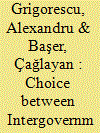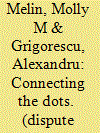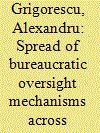| Srl | Item |
| 1 |
ID:
134566


|
|
|
|
|
| Summary/Abstract |
This article argues that long-term changes in Turkish foreign policy are primarily due to the diversification of the country's political and economic interests. Important international structural shifts such as the end of the Cold War or the broad fluctuations in oil prices have constituted the initial impetus for the changes that we have seen in Turkish policies. Discussing alternative perspectives on new activism in Turkish foreign policy, the article gauges Turkey's foreign policy affinity (based on voting patterns in the United Nations General Assembly) and trade with other states to place recent trends in the broader context of the past three decades. It shows that, as the “West” has become less coherent in its policies, Turkey has moved closer to EU members and distanced itself from the US. The data also undermine “shift of axis” arguments as Turkey's foreign policy affinity with Middle Eastern countries has, in fact, declined. The trade data reveal a diversification of the country's commercial interests that contribute to Turkey's increasing regional activism. The country now balances its long term European interests with its recent regional ones.
|
|
|
|
|
|
|
|
|
|
|
|
|
|
|
|
| 2 |
ID:
165595


|
|
|
|
|
| Summary/Abstract |
This article seeks to explain when governments are more likely to take an intergovernmental approach to resolving global collective problems rather than step back and encourage (or simply allow) nongovernmental actors to become the main global governors. The authors suggest that an important factor driving this choice is the domestic ideological leanings of powerful states toward greater or lesser government activism. Such ideologies connect domestic preferences to international ones. They also lead to the establishment of domestic institutions that, in turn, facilitate the emergence of international organizations. Using these arguments, the authors develop a set of inferences regarding the likelihood that governments will establish and join intergovernmental organizations. The authors test their hypotheses through a study of global governance in the education realm, and also apply a series of statistical analyses covering developments in all issue-areas over the last century and a half.
|
|
|
|
|
|
|
|
|
|
|
|
|
|
|
|
| 3 |
ID:
134462


|
|
|
|
|
| Summary/Abstract |
We explore states’ decisions to escalate disputes over their territorial claims or settle them peacefully. We complement existing arguments by accounting for the fact that states are often simultaneously entangled in multiple territorial claims. We build on previous scholarship in positing that two states involved in a territorial dispute will act based on information they glean from each other’s reputation for dealing with claims with other states and their recent actions involving disputes with other states. Because states know that their actions will impact their adversaries’ calculations, the existence of multiple ongoing territorial claims will act as a deterrent from any type of action to resolve the dispute, whether militarized or peaceful. Our hypotheses therefore consider the impact of the number of states’ other territorial claims as well as the number of their adversaries’ claims. Tests using the Issue Correlates of War data support our arguments.
|
|
|
|
|
|
|
|
|
|
|
|
|
|
|
|
| 4 |
ID:
060859


|
|
|
|
|
| Publication |
Jan-Mar 2005.
|
|
|
|
|
|
|
|
|
|
|
|
|
|
|
|
| 5 |
ID:
099121


|
|
|
|
|
| Publication |
2010.
|
| Summary/Abstract |
The study asks why so many intergovernmental organizations (IGOs) have established recently offices and policies intended to facilitate the oversight of their bureaucracies. It begins from a set of hypotheses derived from the principal-agent (PA) literature, a natural starting point for answering this question. It then considers explanations based on norms and institutional diffusion to offer a more complete explanation of developments. The study argues that the empowerment of democratic norms and institutional diffusion processes across IGOs have altered member-states' preferences and allowed them to overcome collective action problems involved in the adoption of oversight mechanisms. The hypotheses are tested across more than 70 organizations. The results suggest that arguments extracted from the PA literature and the one on norms allow us to understand which IGOs are more likely to have bureaucratic oversight mechanisms. On the other hand, models that also take into account diffusion processes allow us to understand better when such mechanisms are adopted.
|
|
|
|
|
|
|
|
|
|
|
|
|
|
|
|
| 6 |
ID:
078840


|
|
|
|
|
| Publication |
2007.
|
| Summary/Abstract |
As intergovernmental organizations (IOs) have grown in number and influence, there has been an increase in calls for their accountability, not just to governments but also toward the general public. One of the principal ways they can improve their accountability is by becoming more transparent, that is, offering more information to the public. Over the past decade, some IOs have adopted official policies and changed their practices concerning public access to information, while others have not. This study asks which IOs are likely to be transparent. To answer this question, it derives several hypotheses based on the existing international relations literature as well as the literature explaining government transparency in the domestic realm. The hypotheses focus on the roles of the principal actors affecting access-to-information from IOs: member states, IO bureaucracies and international nongovernmental organizations. This study tests these hypotheses across 72 IOs by using three newly developed measures of transparency. It finds that some of the main factors that explain IO transparency are analogous to those that have affected government transparency at the domestic level.
|
|
|
|
|
|
|
|
|
|
|
|
|
|
|
|